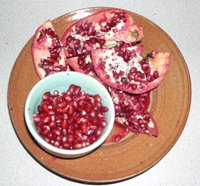
I can remember the first time I tried this bizarre fruit. I had often seen them in grocery stores and my thoughts were always that they were in the squash family. After all, they do appear sort of squashish. I must have been around twelve when I was seated around that kitchen table. I can remember it was just after a soccer game. I cannot remember if we won or lost. I cannot remember who the others were that surrounded me at the table. I do remember the Goddess that imparted her knowledge of this other wordly fruit upon me. She was tall, motherly (not my mother), and had long hair, the color of autumn bark that fell in large, heavy ringlets framing her face.
If I dig deep enough, I can almost remember a heavenly glow that illuminated her as she picked up the fruit and sat us around the table. She did not say anything, but sliced through that thick, leathery, scarlet skin. The blood of the seeds spread in a puddle at the base of the fruit and out dropped a few glistening pulps. I was amazed. How could such an exterior produce such a marvelous interior? (I would later learn Mother Nature has her way with this when it comes to fruits and vegetables.) I was given a few rubies and eagerly popped them in my mouth. The juice was amazing. Giddy at my new discovery, I reached out for more...
The pomegranate truly is an ethereal fruit. It is not native to North America, though is now grown in California and some parts of Arizona. I think the best arrive to us from their origin in Iran and other reaches of the Mediterranean, over to India and into the Himalayas. They mature when most other bounty of summer has faded, best from October to February. The trees are a beautiful spectacle to witness in person. (I came upon some recently in China when I was amazed at seeing fields upon fields of light green maturing pomegranates. I was told they were for local consumption-- how lucky they are!) And when you stand under one, it as if you are transplanted to the Garden of Eden...
The apple, though an equally lovely and quite a delicacy itself, is not native to the warm climates of the Fertile Crescent and Mediterranean. Though it is widely believed that Eve ate an apple from the tree, many argue it was actually a pomegranate (though what an akward image of Eve having to tear through the skin rather than lightly bite into an apple). Michael Pollan in his Botany of Desire, makes note of this fact as well. I like to think it was the pomegranate-- A rare, delicious discovery of sweet fruity granate!
In Spain, they are known as "granada". In France, it is "grenade" and where we receive the namesake grenadine syrup. (When I was younger I always thought grenadine syrup was the sweet syrup of cherries.) In the Middle East, it is not pomegranate syrup that is popular, but pomegranate molasses (and can be found in many local Mediterranean groceries). It is a delicious addition to most any meat dish (amongst other things). I recently roasted a chicken spread with homemade sundried tomato-basil pesto and drizzled with pomegranate molasses (very easy and surprisingly decadent for chicken). But, if I must use pomegranate molasses again, I wish to be transported back in time. I wish to re-create myself sitting in my bathing suit around the table of some of my best friends. My skin sun-kissed and salty, at a dinner of Egyptian feta, olives and homemade grape leaves stuffed with lamb, wild rice, and pomegranate molasses, beside the calm, warm waters of the Red Sea on the Sin'ai Peninsula at dusk. That is my Eden where I'll happily dine on the forbidden fruit whenever asked.